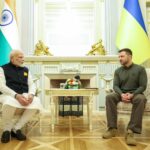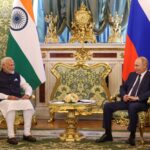Foreign Affairs Minister Anita Anand reaffirmed the importance of India-Canada relations during her meeting with India’s External Affairs Minister S. Jaishankar on the sidelines of the G7 Foreign Ministers’ Meeting held in Niagara, Canada, on November 11–12, 2025.
Recognizing India as the world’s fourth-largest economy and a partner with more than 75 years of diplomatic ties, Anand highlighted the growing momentum in bilateral relations. This was their third meeting in 2025, reflecting steady engagement between the two nations.
Anand offered condolences to Jaishankar over the recent explosion in New Delhi and expressed Canada’s solidarity with the people of India during this tragic time.

The ministers discussed progress under the Canada-India joint roadmap, which focuses on cooperation in energy, trade, and people-to-people ties, as well as the ongoing law enforcement dialogue between both countries. They agreed to remain in touch as the roadmap continues to be implemented.
During their meeting, outside the G7 venue, a small group of pro-Khalistan demonstrators held protests carrying flags and banners. Security forces maintained strict checks around the White Oaks Resort, including inspections of protestors’ belongings to ensure public safety.
In a sign of continued high-level engagement, preparations are underway for Canadian Prime Minister Mark Carney’s visit to India early next year. Meanwhile, International Trade Minister Maninder Sidhu is currently in India to advance bilateral trade cooperation.
Anand also announced additional sanctions under the Special Economic Measures (Russia) Regulations, targeting Russia’s energy revenues, financial enablers, and military technologies. The sanctions list 13 individuals and 11 entities, including several connected to Russia’s drone program.
“For the first time, Canada has also sanctioned entities that supply the cyber infrastructure used in Russian hybrid strategies against Ukraine,” Anand said. Several Russian liquefied natural gas firms and 100 vessels from Russia’s shadow fleet were also sanctioned.
She added, “Canada remains unwavering in its commitment to Ukraine’s sovereignty and its people, who are forcefully defending their rights in the face of Putin’s corrosive and aggressive actions. Canada will continue to intensify pressure through sanctions in coordination with allies and partners until Russia puts an end to its unjustified invasion of Ukraine.”
Since 2014, Canada has imposed sanctions on more than 3,300 individuals and entities involved in violating Ukraine’s sovereignty or committing human rights abuses. Many of these measures have been coordinated with G7 allies, including the United States, the United Kingdom, and the European Union.
As host of the final G7 event under Canada’s presidency, Anand also met with Japan’s Foreign Minister Motegi Toshimitsu. Their first in-person meeting focused on strengthening security, defense, and economic cooperation under the Canada-Japan Action Plan. Anand described Canada as “a stable and reliable partner in bolstering Japan’s economic and energy security.”
She reaffirmed Canada’s commitment to the Indo-Pacific strategy and emphasized collaboration with Japan across defense, economic resilience, and shared democratic values. Both ministers agreed to deepen bilateral and people-to-people ties as Canada and Japan approach 100 years of diplomatic relations in 2028.
Anand also met Yvette Cooper, the United Kingdom’s Secretary of State for Foreign, Commonwealth and Development Affairs, in Oakville, Ontario. They discussed expanding trade and investment through the Canada-UK economic and trade working group and reaffirmed the enduring transatlantic partnership grounded in shared values and history. Anand outlined Canada’s priorities regarding NATO defense spending and the need to strengthen transatlantic security.






